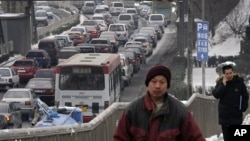China's rapid economic growth is causing some strains - and they are increasingly evident on the roads of the country's big cities. Traffic jams fill news headlines and create headaches for a growing number of people.
Beijing is the capital of the world's most populous country. At rush hour, the city's roads become clogged. The city has 4 million cars, and 2,000 more are added every day.
World Bank transportation analyst Shomik Mendhiratta says a good economy spurs car sales.
"You have seen that China and Beijing have seen double-digit economic growth, which has taken them to a national GNP (gross national product) per capita of $4,000 dollars, with Beijing being maybe two and a half times that," he said. "As you would expect, this kind of per capital income and this kind of double-digit growth, you are seeing an absolute boom in motorization."
Two years ago, China responded to the global financial crisis with a stimulus plan that helped fast-track projects for new roads, bridges and railways. It funded high-speed railway lines, including a new one between Shanghai and Hangzhou, which reduces the journey from two hours to about 40 minutes.
One of the first passengers was Zhou Caoying. She excitedly pointed to the display showing that the train had reached a speed of 356 kilometers an hour.
Zhou says she feels very proud that China has this achievement now.
The government stresses rail as an environmentally cleaner and more efficient urban transportation method. Tsinghua University economist Hu Angang backs that view.
Hu says up until 2015, the Chinese government will invest $600 billion (four trillion yuan) to develop high speed railroads, and fast railroads, and long-distance railroads.
He says rail is safe and energy-saving.
But in big cities like Beijing, the World Bank's Mendhiratta says he sees real economic damage as long as private cars win out against mass transport.
"For a single person, the inconvenience of being stuck in a traffic jam is at least for the moment balanced out by being able to switch on the air con[ditioner] and listen to their own version of Lady Gaga," said Mendhiratta. "But the societal cost of the delay each person imposes on everybody else is adding up very quickly, and at some point the city leadership starts seeing that it is taking a toll on productivity."
Clogged roads mean it takes longer for businesses to get goods they need, and for workers to complete tasks such as sales calls. And all those cars add to Beijing's air pollution; world environmental experts say the city has some of the world's air pollution, which contributes to numerous health problems.
Traffic experts also say that more cars mean more land must be used for roads, pushing homes and businesses farther away from the city center.
These are problems Chinese leaders are apparently aware of. Chinese media reports say that in the country's next five-year development plan, the proportion of spending on railways will increase by a large margin, while the amount spent on roads will fall.




